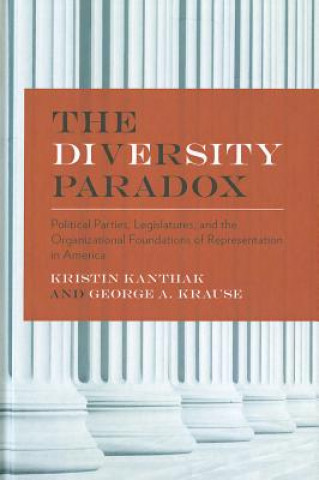
Kód: 04536490
Diversity Paradox
Autor Kristin Kanthak, George Krause
Majority-minority group relations are central to the proper functioning of any organization, but these relationships are especially important in democratically-elected legislatures. In legislatures, for example, group dynamics aff ... celý popis
- Jazyk:
 Angličtina
Angličtina - Väzba: Pevná
- Počet strán: 224
Nakladateľ: Oxford University Press Inc, 2012
- Viac informácií o knihe

Mohlo by sa vám tiež páčiť
-

Mr. and Mrs. Madison's War
16.13 € -13 % -

Protection of Electricity Distribution Networks
166.22 € -

Seeing What Others Don't
16.84 € -20 % -

Bioindicator Systems for Soil Pollution
212.70 € -

Bouvard et Pecuchet
11.86 € -

Die Gedanken werden Handgreiflich
51.54 €
Darčekový poukaz: Radosť zaručená
- Darujte poukaz v ľubovoľnej hodnote, a my sa postaráme o zvyšok.
- Poukaz sa vzťahuje na všetky produkty v našej ponuke.
- Elektronický poukaz si vytlačíte z e-mailu a môžete ho ihneď darovať.
- Platnosť poukazu je 12 mesiacov od dátumu vystavenia.
Viac informácií o knihe Diversity Paradox
Nákupom získate 450 bodov
 Anotácia knihy
Anotácia knihy
Majority-minority group relations are central to the proper functioning of any organization, but these relationships are especially important in democratically-elected legislatures. In legislatures, for example, group dynamics affect how the legislature operates, who is valued enough to play a critical decision-making role, and what voices matter in determining policy outcomes. In The Diversity Paradox, George Krause and Kristin Kanthak explore the nature of these relationships, particularly their effect on both the valuation of minority group legislators and the ideological stability of the legislature in general. Interestingly, they demonstrate that an increase in a minority group's size within a legislature actually leads to the devaluation of individual minority group members. They call this the 'diversity paradox': In fact, representative institutions such as legislatures face a 'diversity paradox': when the size of a minority group increases beyond mere 'tokenism' in representative institutions such as legislatures, it tends to create an unintended backlash toward the minority group's members that emanates from both majority and fellow minority group members. Representative institutions, therefore, can only fulfill the promise of adequate representation of minority group interests only by conquering this paradox. They can accomplish this through jointly attaining sufficient 'numbers' and overcoming the coordination problems those numbers create. This is no small task and no small issue: the inclusion of minority group voices in representative institutions is critical in a wide range of political decisions, ranging from legislative gender quotas in the new Iraqi constitution to attempts in the U.S. to increase minority representation through redistricting. The question of whether or not an increase in descriptive representation (numbers) has an impact on substantive representation (policy) is central to such efforts, and therefore The Diversity Paradox has important ramifications for all students interested in democratic representation.
 Parametre knihy
Parametre knihy
Zaradenie knihy Knihy po anglicky Society & social sciences Politics & government Political structure & processes
180.63 €
- Celý názov: Diversity Paradox
- Podnázov: Parties, Legislatures, and the Organizational Foundations of Representation in America
- Autor: Kristin Kanthak, George Krause
- Jazyk:
 Angličtina
Angličtina - Väzba: Pevná
- Počet strán: 224
- EAN: 9780199891726
- ISBN: 0199891729
- ID: 04536490
- Nakladateľ: Oxford University Press Inc
- Hmotnosť: 524 g
- Rozmery: 237 × 162 × 20 mm
- Dátum vydania: 24. May 2012
Obľúbené z iného súdka
-

Democracy in America
5.47 € -26 % -

The Prince
4.05 € -13 % -

Republic and The Laws
8.92 € -23 % -

CONVERSATIONS WITH MYSELF
17.65 € -23 % -

Stalin
19.78 € -18 % -

Anarchy, State, and Utopia
24.65 € -

Prince
8.92 € -23 % -

The Prince
3.54 € -24 % -

Weapons of Math Destruction
11.66 € -19 % -

Prince
8.92 € -23 % -

How the World Works
18.56 € -23 % -

Prince
14.30 € -23 % -

JFK and the Unspeakable
20.19 € -23 % -

The Road to Unfreedom
10.54 € -24 % -

Red Notice: How I Become Putins No 1 Enemy
11.46 € -20 % -

Twilight of Democracy
11.15 € -25 % -

From Dictatorship to Democracy
8.92 € -23 % -

Signal and the Noise
17.85 € -13 % -

Audacity of Hope
12.17 € -23 % -

Social Origins of Dictatorship and Democracy
28.81 € -6 % -

State in the Third Millennium
42.51 € -4 % -

How to Stand Up to a Dictator
11.36 € -23 % -

Oxford IB Diploma Programme: Authoritarian States Course Companion
51.14 € -

Democracy in America
13.69 € -21 % -

Prince
7.91 € -22 % -

Theory U: Leading from the Future as It Emerges
41.70 € -17 % -

How Democracy Ends
11.05 € -23 % -

World As It Is
11.15 € -25 % -

Democracy Incorporated
23.03 € -4 % -

Red State, Blue State, Rich State, Poor State
25.46 € -

Tyranny of Merit
11.15 € -25 % -

Utopia
5.47 € -26 % -

Stalin, Vol. I
20.69 € -23 % -

Concise Oxford Dictionary of Politics and International Relations
15.31 € -23 % -

Future of Freedom
16.94 € -12 % -

Book of Lord Shang
41.09 € -

Winter Is Coming
11.46 € -20 % -

Republic
9.43 € -15 % -

Orban
20.49 € -10 % -

Likewar: The Weaponization of Social Media
16.43 € -22 % -

Obama: An Intimate Portrait
38.25 € -22 % -

Prince
13.79 € -4 % -

How to Run a Country
16.33 € -26 % -

Road to Somewhere
11.15 € -25 % -

Hitler
20.69 € -23 % -

Democracy for Realists
20.19 € -19 % -

Mrs. Kennedy and Me
15.62 € -23 % -

Oxford Handbook of Comparative Constitutional Law
63.92 € -3 % -

Prince
14.81 € -23 %
Osobný odber Bratislava a 2642 dalších
Copyright ©2008-24 najlacnejsie-knihy.sk Všetky práva vyhradenéSúkromieCookies



 21 miliónov titulov
21 miliónov titulov Vrátenie do mesiaca
Vrátenie do mesiaca 02/210 210 99 (8-15.30h)
02/210 210 99 (8-15.30h)